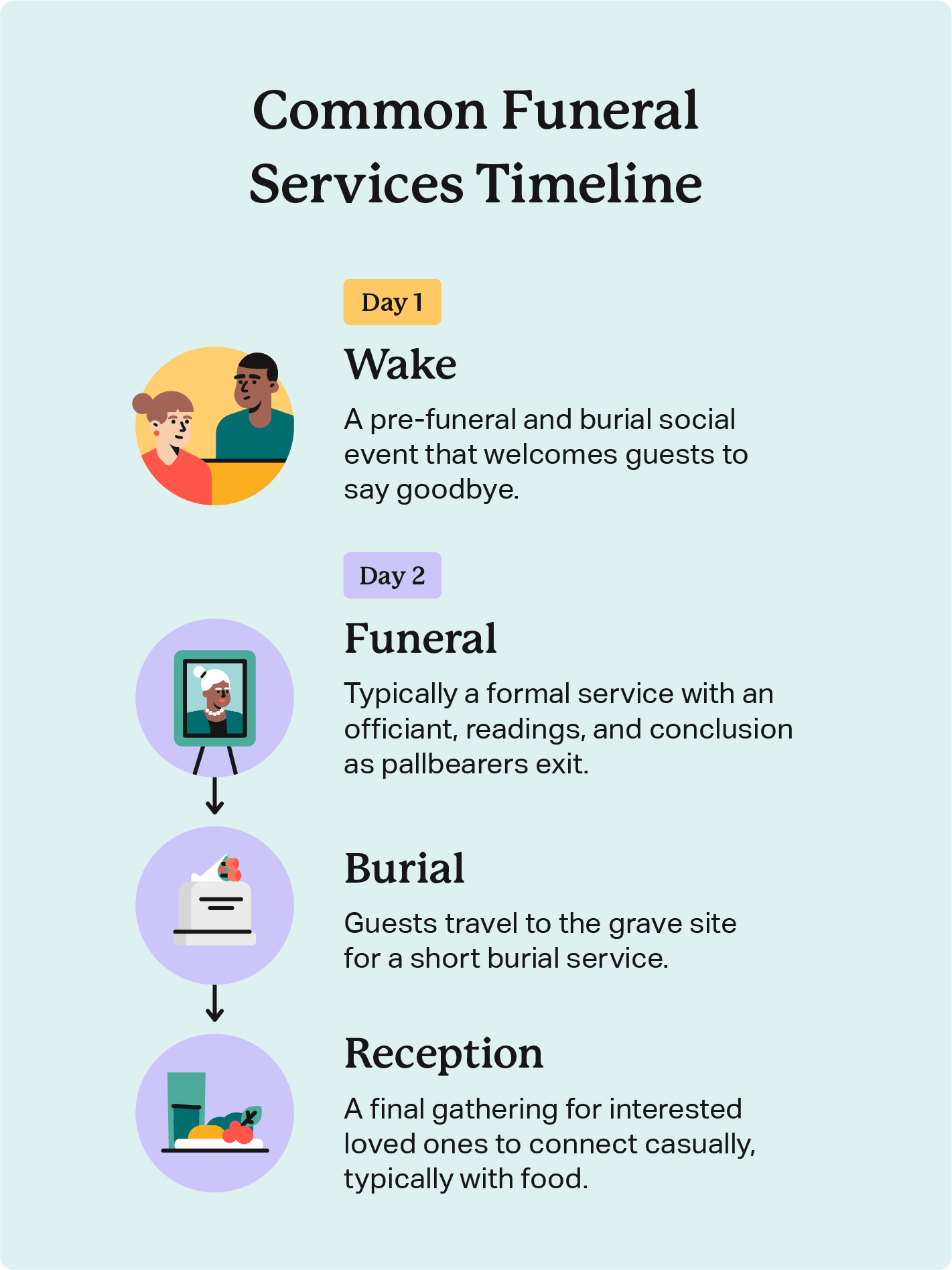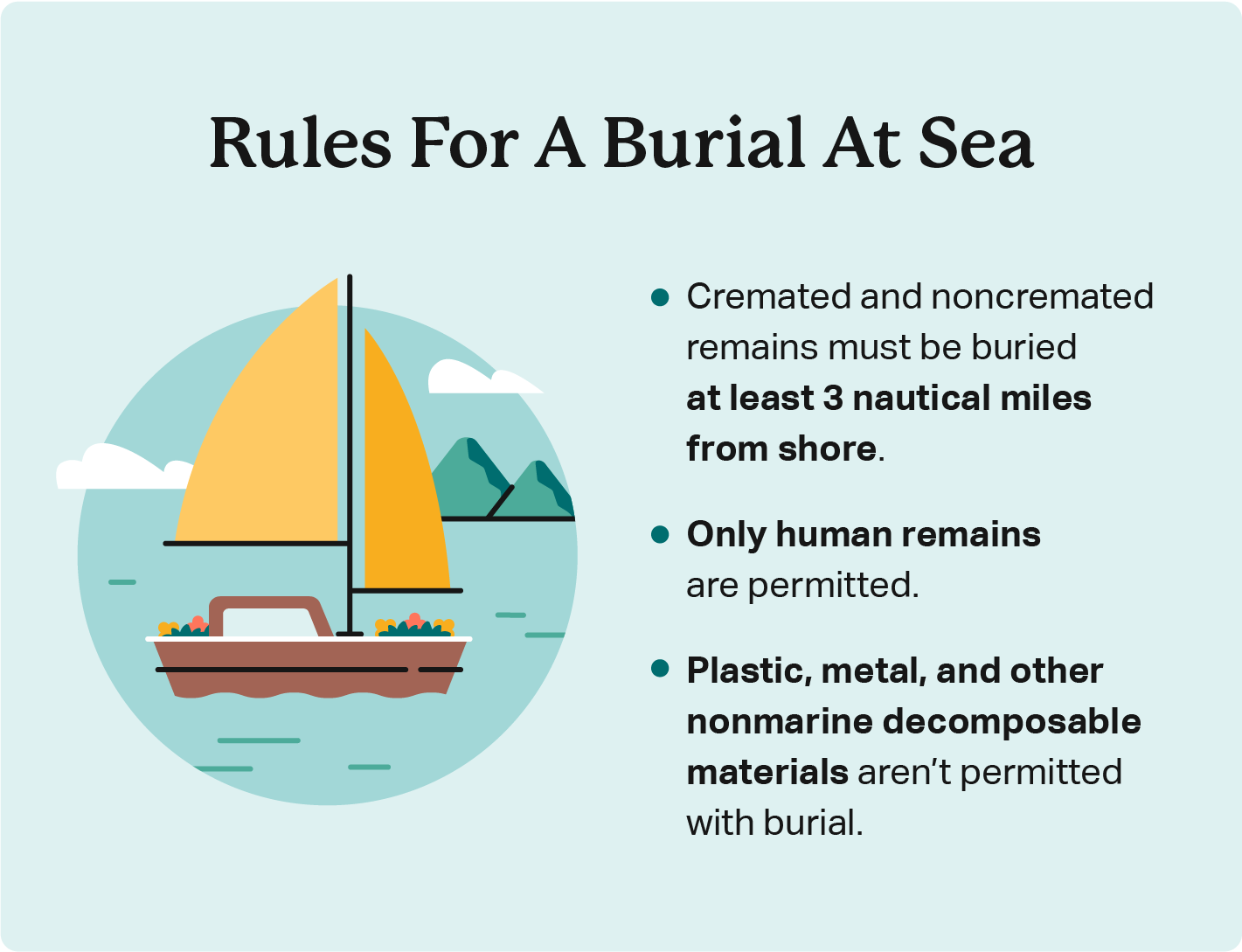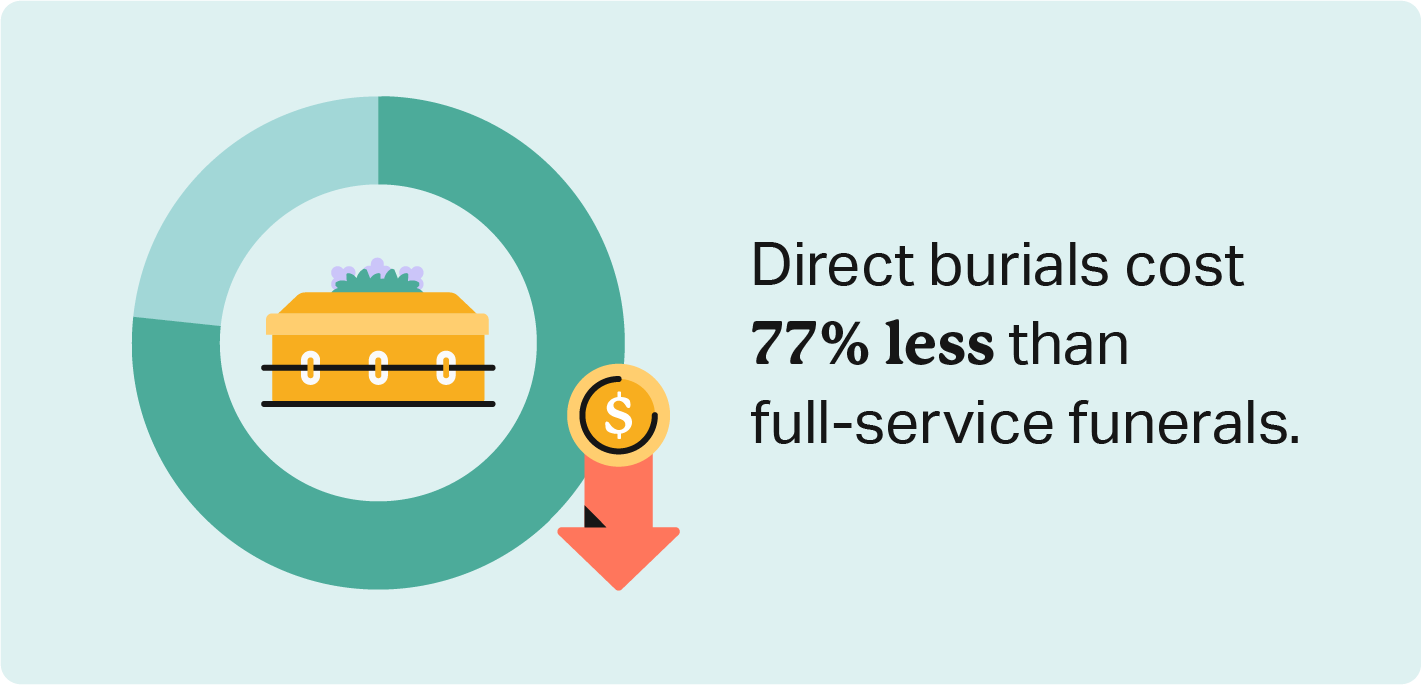Types of funerals range from simple, direct burial services to honorable burials at sea and everything in between.
Funerals are an important way for surviving loved ones to celebrate life and share a final farewell. Because of this, they’re customizable based on the departed and their family’s wants and needs.
Where some people find support with religion and faith, others lean on their values with a green burial or the community with an open memorial service. Learn more about typical services below.
1. Religious Funerals
Spiritual individuals often find comfort in their faith and opt for a religious funeral to honor their beliefs and life journey. Religious funerals may feature more formal rituals than secular services, but they’re still customizable based on the deceased and their family’s interests.
The specific religion and church may determine certain customs, like when the funeral will occur, whether a burial or cremation is most appropriate, and the prayers or hymns shared during the service. A church leader typically begins the service and may invite others to share eulogies.
Outside of the specific prayers and service leaders, religious services and traditional memorials are similar. The funeral process may include a few service types, beginning with a viewing, then a formal funeral service, burial, and reception.
2. Nonreligious Funerals
Not everybody commits to a certain religion or is interested in the traditions of a religious funeral, and secular ceremonies accommodate these people and their families.
Nonreligious funerals may recite poems and personal readings, invite loved ones to share eulogies and feature a viewing. They won’t typically rely on Scripture or religious figures to lead the services, though families can incorporate spirituality and faith elements as they see fit.
3. Memorial Services
Memorial services are an alternative to formal funerals that focus on the life, accomplishments, and values of a departed loved one. They don’t often include the body or a viewing and may occur after a funeral or burial.
Rather than eulogies and prayers focused on the transition of death, people often celebrate life by sharing stories, photos, and connections with others.
Memorials are more flexible than typical funeral services. People may plan a memorial well after a person passes to commemorate a special date or allow out-of-town visitors to make arrangements. They’re also held in private residences, community centers, or parks rather than funeral homes or churches.
4. Green Funerals
Environmental stewardship is a growing value that influences an individual’s daily life and choices, and there’s a place for sustainability in the death industry, too. Green burials aim to reduce the negative environmental impact of traditional burials, cremations, and memorial services.
A green funeral means a body isn’t embalmed or traditionally cremated — which produces 250,000 tons of carbon dioxide emissions annually — so that the natural body can decompose in the Earth without pollutants.
This funeral might opt for a home viewing shortly after death or a memorial since the body can’t be preserved long term. Either service would also prioritize sustainability with choices like:
- Reusable dishware
- Digital programs
- Native wildflowers
- Natural headstones
- Untreated, natural casket or body shroud
Green burials at a dedicated natural burial site are an eco-friendly alternative to traditional high-maintenance, landscaped cemeteries. Sustainable water cremation is another alternative for low-emission care, and ashes can be scattered, kept in an urn, or even placed in a tree burial pod.
5. Burial At Sea
Seaside services are relatively common for cremated ashes, but you can also opt for a full-body burial at sea. This is a popular option for veterans and service members of the Navy, Coast Guard, and Merchant Marines. Veterans may even qualify for a free funeral at sea.
Some religious and cultural traditions, like those of Hinduism, also prioritize water burials. Water and sea burials are commonly seen in ancient burial rites, too.
The Environmental Protection Agency (EPA) regulates burials at sea, so the planning isn’t as straightforward as calling your funeral director. There are location and material restrictions for what you can bury at sea, and you’ll need a special permit for a proper burial.
Once you decide on a general location, local boat chartering companies are a good place to start gathering information. Many offer burial services and know the local laws and regulations to help you plan your service.
6. Military Funeral Service
Military funeral services are available for active-duty service members and veterans, and they may qualify for free military burial and funeral benefits. These services don’t necessarily impact the funeral itself, but they may affect the following:
- Burial service
- Burial site
- Grave marker
Anyone who qualifies for military honors will receive a bugle performance of “Taps” and a ceremonial flag folding and presentation service from a two-person military detail. Services may also feature:
- Rifle volley salute
- Color guard
- Military pallbearers
- Military flyover
Eligible veterans and servicemembers can also be buried in a state cemetery and receive allowances for the burial, nonstate burial plot, and headstone. Families can work with their funeral director and/or the deceased’s casualty assistance offer to prepare military honors.
7. Direct Burials
Direct burials skip the traditional funeral or memorial service for a burial ceremony instead. Families can opt for a simple burial with immediate loved ones invited to pay their respects or a more involved burial with graveside eulogies and prayers.
Regardless, these aren’t open to the community or coordinated with speakers or many rituals. Consider what the deceased would want and how family and friends might like to pay respects when deciding if a direct burial is appropriate.
Direct burials typically work with a mortuary or crematory to arrange the body’s care rather than a funeral home, which provides whole-package services for more traditional funerals. This is easier to plan and more cost-effective than full-service funerals, saving between $4,000 and $6,000 compared to a burial with a funeral.
8. Wake
Wakes, also sometimes connected with viewings, are a pre-funeral event where family and friends gather to celebrate and mourn the deceased with others who loved them.
Modern wakes are often the day before a funeral and publicized in an obituary to welcome other community members to pay their respects. Unlike funerals, there’s not a formal program, speaker, or agenda.
Religious wakes are common with Catholic funerals, which may last longer and are more formal than a modern viewing. Other religions and cultures have their own wake rituals, so the service varies.
9. Scattering Ashes
Families that cremate their loved ones can still hold a memorial or funeral service, but they have the additional option to scatter the remains somewhere meaningful. Organizers can hold a private scattering or welcome other loved ones to witness the event, share stories, and say a final farewell to the deceased.
Beaches, favorite vacation spots, private homes, and even space are all location options for a scattering ceremony.
These are relatively informal events compared to organized funerals. Families can invite religious leaders to speak, incorporate meaningful rituals, or plan a reception to follow.
Cover Any Funeral With Final Expense Insurance
End-of-life memorials are deeply personal services that should reflect the deceased and the life they lived. Choosing and planning the right type of funeral while grieving can feel overwhelming.
Preplanning arrangements and open discussions with your family before their death is its own challenge, but it can help you understand your loved one’s final wishes and feel confident carrying them out when the unfortunate day comes.
Final expense burial insurance is also available to make final wishes come true without having to pay thousands out of pocket. Compare prices and determine what coverage is right for you.
- Nationally licensed life insurance agent with over 15 years of experience
- Personal annual production that puts him in the top .001% out of all life insurance agents in the nation.
Anthony Martin is a nationally licensed insurance expert with over 15 years of experience and has personally served over 10,000 clients with their life insurance needs. He frequently authors entrepreneurial and life insurance content for Forbes, Inc.com, Newsweek, Kiplinger, and Entreprenuer.com. Anthony has been consulted as an expert life insurance source for dozens of high-profile websites such as Forbes, Bankrate, Reuters, Fox Business, CNBC, Investopedia, Insurance.com, Yahoo Finance, and many more.
- Nationally licensed life insurance agent with over 19 years of experience
- Best selling Amazon author.
Jeff Root is a nationally licensed life insurance expert with over 19 years of experience. He has personally helped over 3000 clients with their life insurance needs. Jeff is a best-selling Amazon author and the managing partner of a highly successful insurance brokerage that manages over 2,500 licensed insurance agents across the USA. He has been a featured life insurance source for prestigious websites such as Forbes, Bloomberg, MarketWatch, Nerdwallet, and many more.
- Nationally licensed life insurance agent with over 14 years of experience
- Best selling Amazon author of five insurance sales books.
David Duford is a nationally licensed insurance expert with over 14 years of experience. He has personally helped more than 15,000 clients buy life insurance. David has been featured as an expert source for highly authoritative publications such as A.M. Best and Insurancenewsnet. He also runs one of the largest Youtube channels to help aspiring insurance agents serve their clients better.
- Nationally licensed life insurance agent with over 19 years of experience
- Best selling Amazon author.
Jeff Root is a nationally licensed life insurance expert with over 19 years of experience. He has personally helped over 3000 clients with their life insurance needs. Jeff is a best-selling Amazon author and the managing partner of a highly successful insurance brokerage that manages over 2,500 licensed insurance agents across the USA. He has been a featured life insurance source for prestigious websites such as Forbes, Bloomberg, MarketWatch, Nerdwallet, and many more.
- Nationally licensed life insurance agent with over 14 years of experience
- Best selling Amazon author of five insurance sales books.
David Duford is a nationally licensed insurance expert with over 14 years of experience. He has personally helped more than 15,000 clients buy life insurance. David has been featured as an expert source for highly authoritative publications such as A.M. Best and Insurancenewsnet. He also runs one of the largest Youtube channels to help aspiring insurance agents serve their clients better.
Choice Mutual often cites third-party websites to provide context and verification for specific claims made in our work. We only link to authoritative websites that provide accurate information. You can learn more about our editorial standards, which guide our mission of delivering factual and impartial content.
-
250,000 tons of carbon dioxide emissions. https://papers.ssrn.com/sol3/papers.cfm?abstract_id=3537225
-
Environmental Protection Agency (EPA). https://www.epa.gov/ocean-dumping/burial-sea
-
special permit. https://www.epa.gov/ocean-dumping/special-and-research-permits-ocean-dumping
-
casualty assistance offer. https://www.militaryonesource.mil/casualty-assistance/survivor-support/understanding-the-role-of-the-casualty-assistance-officer/











